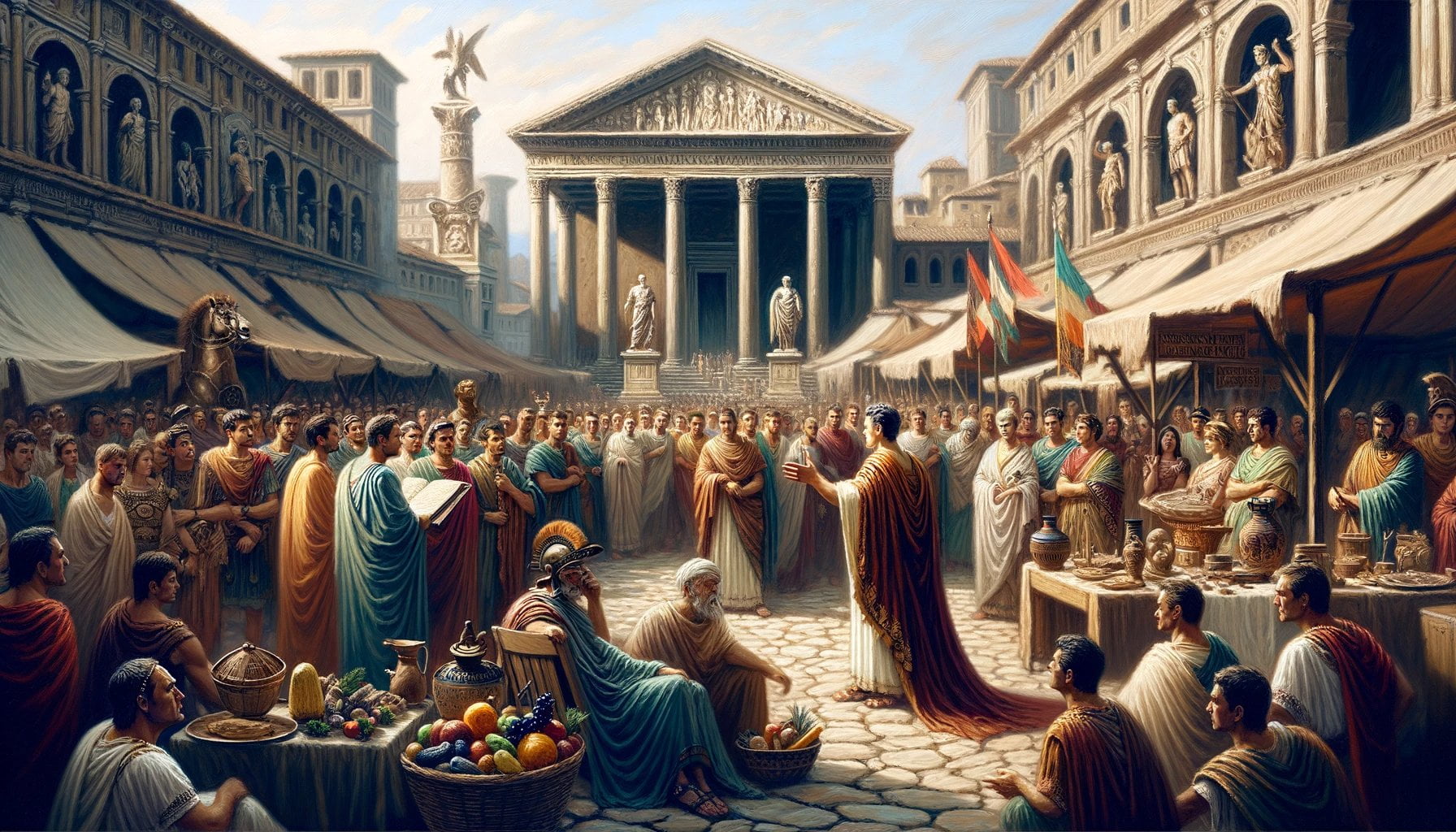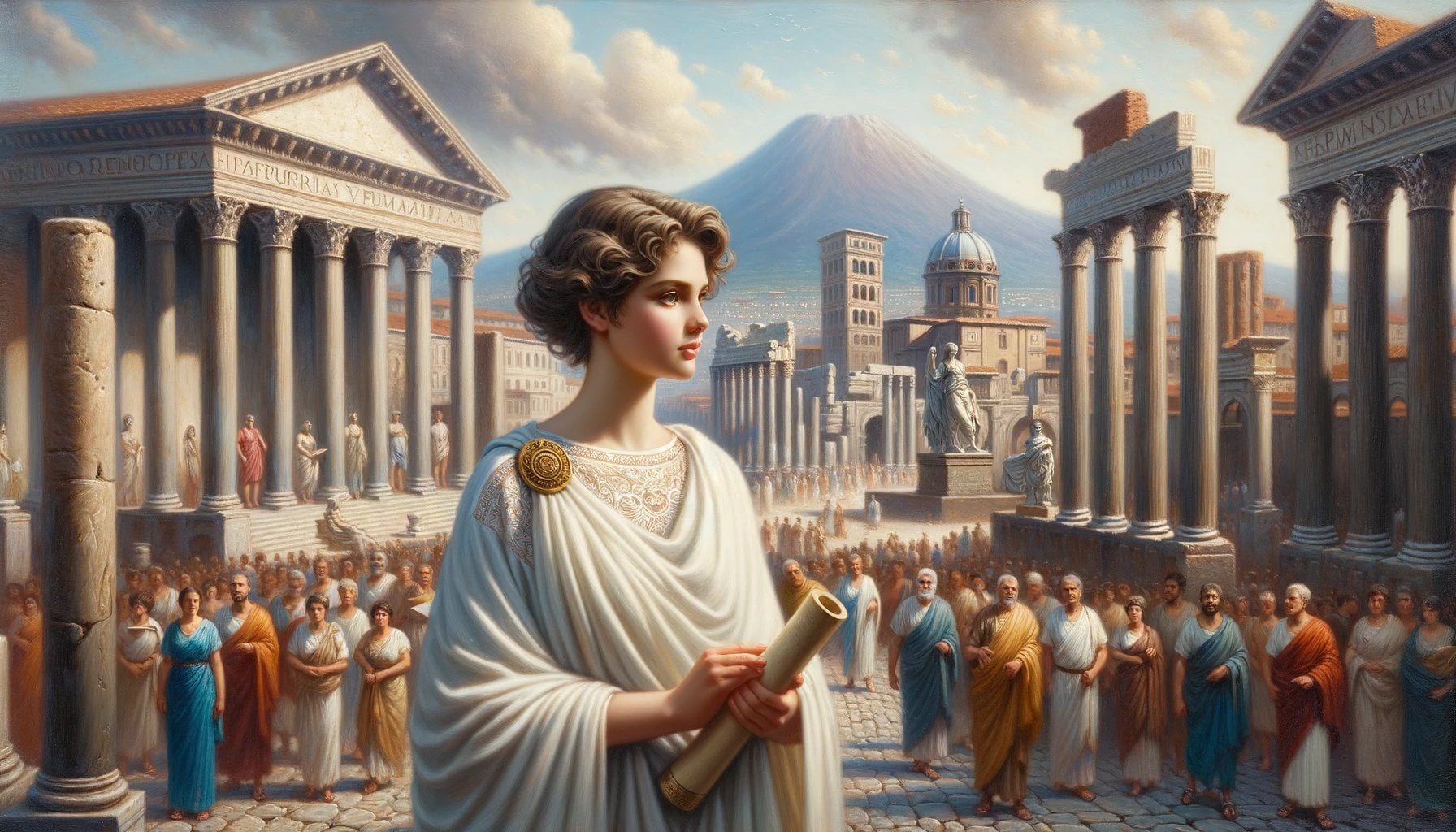Discover the fascinating world of praetors in ancient Rome as we unravel their pivotal role in shaping one of history’s greatest empires. In this article, we delve into the intricate web of law enforcement, administration, and political influence that these esteemed magistrates wielded, painting a vivid picture of their significance in the Roman society. With a meticulous approach to research and a passion for historical context, we invite you on a captivating journey back in time to truly grasp the complexities and impact of praetors in ancient Rome.

Key Takeaways:
– Praetors were Roman magistrates who held judicial and administrative authority.
– They were responsible for cases of equity, the production of public games, and the command of armies.
– Praetors were elected by the people and held extensive power in the absence of consuls.
– The role of praetor evolved over time and they played a crucial role in shaping the Roman empire’s trajectory.
– In later Roman era, praetors focused on administering justice during court proceedings.
– The institution of praetors also survived in the Byzantine Empire.
Praetors in Ancient Rome: Unraveling their Pivotal Role
The role of praetors in ancient Rome was vital to the functioning of the government and society. Drawing their name from the Latin word “praetor,” meaning “the one who goes before the others,” these magistrates held both judicial and administrative authority. In this article, we will explore the evolution of praetors, their duties, and their impact on shaping the Roman Empire’s trajectory.
The Evolution of Praetors
The origins of the praetorship in ancient Rome are somewhat unclear, but it is believed to have been established around 367 BC. Over time, this position evolved from basic leadership to a formalized magistrate role. Initially, praetors were responsible for commanding armies, ensuring the safety of the Roman Republic. As the republic developed, their duties expanded to include various administrative tasks and acting as judges in both civil and criminal trials.
Duties and Responsibilities
Praetors held extensive power in the absence of consuls, who were typically elected by the Senate. Their election by the people granted them authority in governance, and they had the ability to issue acts and make decisions in civil cases. Praetors were also responsible for managing the financial aspects of public events and games, ensuring the efficient use of resources.
The Role of Praetors in Law Enforcement
One of the key roles of praetors was the administration of justice. They presided over tribunals, where they would examine evidence, listen to arguments, and deliver verdicts. To emphasize their authority, praetors sat on a sella curulis, a special chair reserved for them, their assessors, and friends during court proceedings. This visual representation of power underscored the importance of their decisions.
Praetors and the Roman Empire
As the Roman Empire expanded, the role of praetors shifted. While still responsible for judicial matters, their focus turned more towards managing public affairs and ensuring the fair administration of justice throughout the empire. In the later years of the Roman era, praetors primarily oversaw the execution of justice in tribunals, upholding the rule of law.
Legacy and Byzantine Empire
Despite the fall of the Roman Empire, the praetorship did not vanish entirely. In the Byzantine Empire, the institution of praetors survived. Emperor Justinian I implemented administrative reforms that reintegrated praetors with other magistrates. This continuity highlights the lasting influence and significance of praetors in ancient Roman governance.
Praetorship in Retrospect
The role of praetors in ancient Rome cannot be understated. They were magistrates entrusted with extensive power and responsibility, serving as administrators, judges, and even commanders of armies. Their journey from basic leaders to institutionalized magistrates shaped the Roman Empire’s trajectory and ensured the fair administration of justice.
In conclusion, the praetors played a pivotal role in ancient Rome, contributing to the government’s effectiveness and maintaining the rule of law. Their influence extended beyond their time, continuing in the Byzantine Empire. By unraveling their duties and understanding their significance, we can delve deeper into the intricate workings of the Roman civilization and appreciate the impact of praetors on shaping its history.
Please check out our fascinating article on poetry in ancient Rome. Explore the rich literary traditions and influential poets of this remarkable era.
Discover the unique charm of villages in ancient Rome and gain insights into the daily lives of the Romans outside the bustling city.
Step into the world of ancient Roman entertainment by clicking on our detailed guide to games in ancient Rome. Learn about thrilling spectacles and popular pastimes enjoyed by the Romans.
Experience the fascinating stories of the invaders of ancient Rome, who shaped the course of history with their conquests and conflicts.
Delve into the epic battles that determined the fate of ancient Rome by clicking on our exploration of ancient battle Rome. Uncover the strategies, heroes, and turning points that defined this extraordinary period.
Immerse yourself in the vibrant world of ancient Rome dance. Discover the captivating rhythms, graceful movements, and cultural significance of dance during this captivating era.
Praetors in Administration: Their Duties and Influence
As we journey back to ancient Rome, it becomes evident that praetors played a pivotal role in the administration of the Roman Empire. This article aims to unravel the duties and influence of praetors in the administration, shedding light on their profound impact on Roman society.
Understanding the Power and Authority of Praetors
Praetors were Roman magistrates bestowed with imperium, granting them legal power and authority in various aspects of governance. Initially, their responsibilities primarily revolved around leading armies. However, as Rome evolved, so did the role of praetors. They began assuming administrative tasks and became key figures in the Roman judicial system.
One of the most crucial aspects of a praetor’s duty was presiding over law courts and administering justice. Praetors acted as chief judges in both criminal and civil cases, ensuring the fair application of the law. They possessed the authority to enforce capital punishment, ensuring the maintenance of societal order.
The Role of Praetors in Screening Legal Cases
Before a case reached the court, praetors performed the essential task of screening legal cases. By meticulously examining the details and merits of each case, praetors ensured that only the most significant and relevant matters proceeded to the courts. This process played a vital role in maintaining the efficiency and integrity of the Roman legal system.
Praetors and the Appointment of Judges
When a case did go to court, praetors held the responsibility of appointing a judge, known as an Iudex, to oversee the proceedings. This ensured the impartiality and expertise necessary for fair judgment. Praetors’ authority in this matter guaranteed that the judges appointed were knowledgeable and experienced in the specific area of law related to the case at hand.
Praetors’ Edicts and Interpreting the Law
Praetors played a significant role in interpreting and defining the law through the issuance of edicts. These edicts acted as guidelines, providing clarity and guidance to both judges and citizens regarding the interpretation and application of legal principles. Praetors’ edicts contributed to the development of a unified legal system, ensuring consistency and fairness in the administration of justice.
Praetors as Chief Law Officers and Deputies to Consuls
Praetors held a position of paramount importance in the judiciary of Rome. They acted as the chief law officers, extensively involved in the administration of justice throughout the empire. Additionally, praetors served as deputies to the consuls, particularly in the administration of the provinces. Their role in governing these regions ensured the maintenance of order, stability, and efficient governance.
Key Takeaways:
- Praetors in ancient Rome held immense power and authority in the administration.
- They acted as both judges and administrators, ensuring the fair application of the law.
- Praetors screened legal cases, allowing only the most significant to proceed to court.
- They appointed judges to oversee cases, guaranteeing impartial and knowledgeable judgment.
- Praetors issued edicts, interpreting and defining the law to promote consistency and fairness.
- They served as chief law officers and deputies to the consuls, overseeing the administration of justice and governance throughout the Roman Empire.
Sources:
– ThoughtCo – The Powerful Praetor Roman Magistrate
– Roman Imperium – Praetor: Judicial Leaders – Roman Imperium
The Political Power of Praetors in Ancient Rome
The Role of Praetors in the Roman Republic
During the time of the Roman Republic, praetors held significant political power and played a crucial role in the governance of Ancient Rome. Established around 367 BCE, the praetorship served to separate the judiciary from the authority of the consul (source). As deputies and colleagues to the consuls, praetors exercised extensive authority in the government and held various responsibilities in law enforcement, administration, and the political landscape (source).
Exercising Authority and Maintaining Order
One of the primary responsibilities of praetors was to make decisions in civil court cases. They held the power to preside in law courts, administer the law, and ensure the fair application of justice (source). Additionally, praetors had the crucial task of protecting order in the city and maintaining societal stability. In the absence of consuls, these magistrates had the authority to lead armies and oversee governance (source).
Expanding Duties and Judicial Expertise
Initially, praetors were primarily focused on administering civil law and overseeing the legal system (source). However, as the Roman Empire expanded and its needs evolved, the role of praetors expanded to include managing public affairs and ensuring the fair administration of justice (source). Praetors screened legal cases, determining which ones would go to court, thus maintaining efficiency and integrity within the legal system.
Issuing Guidance and Overseeing Justice
Praetors held an essential position in the Roman judicial system. They appointed judges, known as iudex, to preside over court proceedings, ensuring impartiality and expertise in delivering verdicts (source). Furthermore, praetors issued edicts, providing guidance and interpretation of the law for both judges and citizens (source). This role as chief law officers and deputies to the consuls ensured the proper functioning of justice and governance in the Roman Empire.
Financial Responsibilities and Expansion of Influence
Aside from their judicial and administrative duties, praetors were also responsible for managing the financial aspects of public events and games (source). They were expected to possess a treasury from which they could draw funds for their municipal duties (source). This financial responsibility further strengthened their influence and power within the Roman society.
Key Takeaways:
- Praetors in Ancient Rome held extensive political power, acting as deputies and colleagues to the consuls.
- Their main responsibilities included making decisions in civil court cases, presiding over law courts, administering the law, and leading armies.
- Praetors played a crucial role in separating the judiciary from the consul’s authority and maintaining order in the Roman Republic.
- Over time, praetors’ duties expanded to include managing public affairs and ensuring fair administration of justice.
- They appointed judges, issued edicts, and held the responsibility of screening legal cases.
- Praetors’ financial responsibilities further strengthened their influence and power in Roman society.
Sources:
- Roman-History.org
- ImperiumRomanum.pl
Praetors in Ancient Rome: Unveiling their Crucial Influence
The Legacy and Importance of Praetors in Shaping the Roman Empire
Key Takeaways:
- Praetors in ancient Rome were magistrates entrusted with extensive power and responsibility, shaping the Roman Empire’s trajectory and ensuring the fair administration of justice.
- Originally established around 367 BCE, praetors held both judicial and administrative authority, expanding their duties from leading armies to include crucial roles in the judicial system.
- Praetors presided over law courts, screened legal cases, and appointed impartial judges to maintain integrity in court proceedings.
- These magistrates issued edicts, providing guidance and interpretation of the law, which played a significant role in shaping Roman law and governance.
- As the Roman Empire expanded, praetors’ responsibilities grew to encompass managing public affairs and ensuring the equitable administration of justice.
- Praetors played a pivotal role in maintaining societal order, protecting the city’s stability, and managing the financial aspects of public events and games.
- The influence and power of praetors were further strengthened within Roman society through their financial responsibilities.
The praetors of ancient Rome were central figures in shaping the Roman Empire. Holding both judicial and administrative authority, their ascension to power began around 367 BCE, establishing their pivotal role in Roman society. Initially tasked with commanding armies, praetors took on broader responsibilities, becoming vital contributors to the governance and legal systems of the ancient empire.
Unraveling their Pivotal Role
From Judicial Function to Administrative Duties
Praetors stood as magistrates responsible for administering justice, presiding over law courts, and ensuring the fair application of the law. They played a critical role in maintaining societal order and protecting the stability of the city. With the authority to screen legal cases, praetors decided which ones would go to court, ensuring efficiency and integrity in the judicial process.
To maintain impartiality and expertise in court proceedings, praetors appointed judges, known as Iudex. This ensured fair trials and contributed to the overall trust in the Roman legal system. Praetors also issued edicts that provided guidance and interpretation of the law, shaping the legal landscape of the Roman Empire.
Expanding Influence in Governance
Praetors held extensive power in the government, assuming the administrative duties of consuls when they were absent from Rome. Their authority extended to provinces, where they governed and ensured effective administration. In times of consul absence, praetors stepped in, acting as chief law officers and deputies. This allowed for the continuation of justice and governance even in the consuls’ absence.
Beyond the Judicial and Administrative Realm
As the Roman Empire expanded, the role of praetors underwent significant changes. They became key players in managing public affairs and overseeing the equitable administration of justice. Praetors went beyond their original duties, assuming responsibilities in organizing and managing the financial aspects of public events and games. Their increased influence and power further solidified their position within Roman society.
An Enduring Legacy
The institution of praetors not only endured but thrived, even beyond the borders of the Roman Empire. Emperor Justinian I’s reforms in the Eastern Roman Empire led to the reunification of civil and military authority in the hands of governors, akin to the praetor system. Praetors left an indelible mark on Roman law, governance, and societal order, shaping the trajectory of the Roman Empire.
Conclusion
The legacy and importance of praetors in shaping the Roman Empire are undeniable. Their multifaceted role encompassed judicial and administrative authority, ensuring the fair administration of justice and governing provinces. Praetors’ influence extended beyond their initial sphere of responsibility, playing a crucial role in managing public affairs and maintaining societal order. Through their edicts, they provided guidance and interpretation of the law, ultimately shaping the course of the Roman Empire.

FAQ
Q1: What was the role of praetors in Ancient Rome?
A1: The role of praetors in Ancient Rome was to make decisions in civil court cases, preside in law courts, administer the law, lead armies, and produce public games. They also served as deputies and colleagues to the consuls and exercised extensive authority in the government in the absence of consuls.
Q2: When were praetors first established in Ancient Rome?
A2: The institution of praetors in Ancient Rome arose around 510 BC with the expulsion of the monarchy and the establishment of the Roman Republic.
Q3: What was the significance of the praetor’s imperium?
A3: The praetor’s imperium granted them legal power and allowed them to lead armies. It also included functions such as the administration of civil law and acting as judges in courts of law.
Q4: Did praetors have any administrative duties in addition to their judicial role?
A4: Yes, praetors also governed provinces and assumed administrative duties of consuls when they were absent from Rome.
Q5: How did Emperor Justinian I reform the praetor system in the Eastern Roman Empire?
A5: Emperor Justinian I reformed the praetor system in the Eastern Roman Empire, leading to the reunification of civil and military authority in the hands of governors.
“`json
“`
- Discover the Borough of Frenchtown, NJ: A Delaware River Town Blending History, Art & Nature - November 22, 2024
- Discover Clarks Grove, MN: A Small Town with a Big Heart - November 22, 2024
- Califon Borough, NJ: A Small Town with a Big Heart (and Rich History) - November 22, 2024













